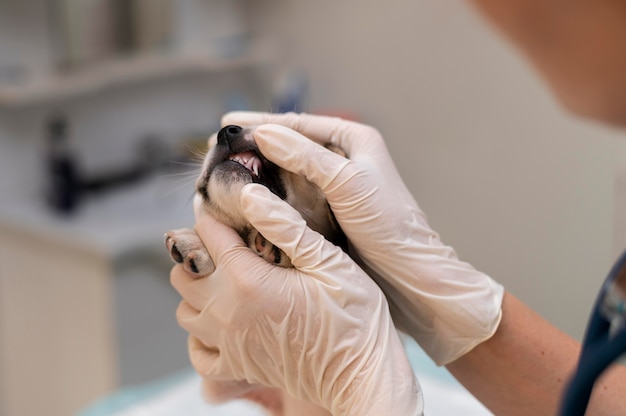Nutritional Needs for Pets: Building a Healthy Diet Plan

Nutritional Needs for Pets: Building a Healthy Diet Plan
As a caring pet owner, you want to give your furry companion the happiest, healthiest life possible. One of the most important ways you can do this is by providing a diet that truly meets your pet's unique nutritional needs. At Pets4Life, located at 661 Central Avenue, Highland Park, IL 60035, we believe that every pet deserves a healthy pet diet tailored to their age, breed, lifestyle, and any special health concerns. Whether you are searching for a "vet near me" who can help you navigate pet nutrition or you simply want practical advice to keep your pet thriving, our team of veterinarians is here to support you every step of the way.
In this blog, we will explore the essentials of pet nutrition, how to recognize if your pet's current diet is supporting their wellbeing, and the role a veterinarian plays in building a customized plan. You will learn how a healthy pet diet can help prevent common illnesses, boost your pet's energy, and support lifelong wellness. We will also discuss when to consider professional guidance, so you can feel confident in giving your pet the very best. If you are interested in learning more about our comprehensive veterinary services in Highland Park and surrounding communities, visit our services page.
How to Recognize if Your Pet Has Unique Nutritional Needs
Every pet is different, and factors such as age, breed, activity level, and underlying health conditions all influence their dietary requirements. Sometimes, it is easy to overlook subtle signs that your pet's nutrition could use a closer look. Classic clues that your dog or cat may need a dietary adjustment include changes in energy levels, unexplained weight gain or loss, and alterations in coat quality such as dull fur or excessive shedding. Some pets develop digestive issues like frequent vomiting, diarrhea, or constipation, while others may start begging for food more often or seem disinterested in meals altogether.
Behavioral changes can also point to nutritional gaps. For example, a normally playful pet may become lethargic, or a calm companion might suddenly seem agitated or anxious. In some cases, skin problems such as itchiness, hot spots, or chronic ear infections can be linked to food sensitivities or imbalanced diets. If your senior pet seems to be slowing down more than expected, or your puppy or kitten is not growing as anticipated, these can also be signs their nutritional needs are not being fully met.
If you notice any of these signs, it is a good idea to consider a wellness examination. Our veterinarians can evaluate your pet’s health and make recommendations for dietary changes that could make a real difference. You can learn more about what to expect during a wellness exam at Pets4Life.
What Influences Pet Nutrition and Diet Planning?
Understanding why some pets need special diets starts with the basics of pet nutrition. The foundation of a healthy pet diet is a balanced blend of proteins, carbohydrates, fats, vitamins, minerals, and water. However, the ideal mix for your pet can vary widely. Puppies and kittens require higher levels of certain nutrients for growth, while adult pets need maintenance diets that support their energy without leading to obesity. Senior animals may benefit from diets lower in calories but higher in joint-supporting ingredients.
Breed also plays a role. For instance, large dog breeds can be prone to joint issues, so their diets may include supplements like glucosamine or omega-3 fatty acids. Small breeds often need calorie-dense food in smaller portions. Cats, as obligate carnivores, require higher protein and taurine levels than dogs. Activity level is another consideration; a highly active working dog needs more energy than a relaxed lap cat.
Medical conditions such as kidney disease, diabetes, food allergies, or gastrointestinal sensitivities may require prescription diets or specific ingredient restrictions. Environmental factors, including the local climate in Highland Park, can affect hydration needs, especially during hot summers or cold winters. Even your pet’s lifestyle, such as spending time at doggy day camp or participating in training, can influence their caloric intake and nutrient requirements.
Building a Healthy Pet Diet: Professional Guidance and Diet Types
Working with a "veterinarian near me" is the surest way to create a diet plan that truly supports your pet’s wellbeing. During a comprehensive wellness exam, our veterinary professionals assess your pet’s weight, body condition, activity level, and overall health. We may recommend diagnostic lab work to screen for underlying conditions that could benefit from dietary management. If needed, we can help you choose between commercial diets, prescription foods, or even home-cooked options—always ensuring your pet’s meals meet veterinary nutritional standards.
Commercial pet foods come in various forms, including dry kibble, canned food, and fresh-prepared diets. Some pets do best on standard maintenance diets, while others require specialized options such as weight management, hypoallergenic, or kidney support formulas. Prescription diets—available through our online pharmacy or by ordering trusted brands like Hill's Science Diet and Purina Pro Plan veterinary diets—are designed to target specific medical needs and are only recommended when clinically appropriate.
For pet owners who prefer home-cooked meals, our veterinarians can offer guidance to ensure these diets provide complete and balanced nutrition. This often involves careful recipe planning and may require supplements to prevent deficiencies. It is important to remember that not all human foods are safe for pets, and certain ingredients such as onions, garlic, grapes, and chocolate are toxic to dogs and cats.
Preventing Nutrition-Related Illnesses at Home
Preventive care is the best way to avoid common nutrition-related health problems in pets. Simple steps such as measuring your pet’s food portions, sticking to a consistent feeding schedule, and avoiding excessive treats can help maintain an ideal weight. Regular exercise, whether it is a walk through Highland Park’s beautiful parks or an energetic session at home, supports calorie balance and overall wellbeing.
Keeping fresh water available at all times is essential, especially during the warm months in our area. Rotating between different protein sources can help prevent food sensitivities, while including specially formulated treats rather than table scraps can reduce the risk of obesity and gastrointestinal upset. Pay attention to your pet’s stool quality, coat condition, and energy level, as these offer valuable clues about how well their current diet is meeting their needs.
Annual wellness exams are a cornerstone of preventive care. These visits allow our veterinarians to detect early signs of nutritional imbalances, recommend tailored dietary adjustments, and monitor your pet’s health as they age. You can explore our comprehensive pet exam options and see why so many families trust Pets4Life for veterinary services in Highland Park.
When to Consult Your Veterinarian About Your Pet’s Nutrition
While minor changes in appetite or weight can sometimes be managed at home, there are situations where professional veterinary advice is crucial. If your pet experiences sudden or severe symptoms like rapid weight loss, persistent vomiting or diarrhea, difficulty eating, or signs of pain during meals, schedule an appointment right away. Ongoing issues such as chronic itching, frequent ear infections, or unexplained behavioral changes may also indicate food allergies or underlying health problems that require a veterinary assessment.
For pets with chronic medical conditions, such as diabetes, kidney disease, or gastrointestinal disorders, dietary management is a critical part of their treatment plan. Our veterinary team will work closely with you to monitor your pet’s progress and adjust their diet as needed to optimize quality of life. Never change your pet’s diet drastically without consulting a veterinarian, as abrupt transitions can trigger digestive upset or worsen existing health issues.
If you are ever unsure about a new food, supplement, or feeding strategy, our veterinarians are here to help. We encourage you to reach out with your questions and concerns so we can keep your pet on the path to lifelong wellness. For more information about our veterinary services in Highland Park and surrounding communities, explore our website or give us a call.
Give Your Pet the Gift of Great Nutrition: Schedule an Appointment Today
Supporting your pet’s nutritional needs is one of the most powerful ways to promote a long, happy, and healthy life. By understanding the basics of pet nutrition and recognizing when your companion might need extra dietary support, you can make informed choices that pay off for years to come. At Pets4Life, our veterinarians are dedicated to helping you build a healthy pet diet plan that fits your pet’s unique lifestyle, age, and health status.
If you are searching for a "veterinarian near me" or seeking advice about healthy pet diets in Highland Park, our veterinary professionals are here to help. Schedule an appointment at our conveniently located clinic at 661 Central Avenue, Highland Park, IL 60035 for personalized nutrition counseling, wellness exams, and ongoing preventive care. You can also explore our wellness examination services to learn how regular checkups support your pet’s health from nose to tail.
To get started, call (847) 434-2745 today. Our veterinary team is proud to serve Highland Park and surrounding communities, and we look forward to helping your pet thrive at every stage of life.
This blog is intended for educational purposes only. For specific health questions or concerns about your pet, always consult your veterinarian or schedule a visit with our veterinary professionals at Pets4Life.






